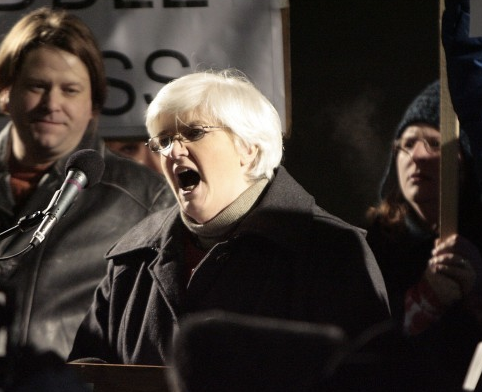‘States Are Under No Obligation to Aid the Unions in Their Political Activities’

To the consternation of President Mary Bell and the rest of the Wisconsin Education Association Council teacher union hierarchy, a federal court has just upheld the Badger State's two-year-old law curtailing monopoly bargaining and other Big Labor special privileges in the government sector. Image: Collin Roth/Madison.com
On January 18, a panel of judges on the U.S. Court of Appeals for the Seventh Circuit unanimously rebuffed a bid by Wisconsin Education Association Council (WEAC/NEA) and other union officials to get declared unconstitutional the Right to Work provision in Act 10, the public-sector labor-law reform adopted by Badger State legislators and signed into law in 2011 by GOP Gov. Scott Walker over Big Labor’s vociferous protests. The panel also unanimously rejected union lawyers’ efforts to overturn Act 10 provisions substantially reducing the scope of teacher and other government union bosses’ monopoly power to bargain over employees’ wages, benefits, and work rules.
The anti-Act 10 federal lawsuit filed by the WEAC union hierarchy and its allies acknowledged that state and local governments are under no constitutional obligation to extract forced dues or fees from public servants. The suit also admitted there is no constitutional mandate for public entities to recognize unions as employees’ “exclusive” representatives in contract negotiations.
However, union lawyers insisted that legislators and Gov. Walker acted with nefarious motives in sharply reducing the special privileges of most government union bosses, while leaving analogous privileges for most public-safety union officials untouched. And because of these supposedly bad intentions Act 10 violates the U.S. Constitution, according to union lawyers.
All three members of the Seventh Circuit panel found this Big Labor argument unconvincing. In a section of his majority opinion that was endorsed by both the other members of the panel, Justice Joel Flaum wrote: “Distinguishing between public safety unions and general employee unions may have been a poor choice, but it is not unconstitutional.
By a 2-1 majority, the Seventh Circuit panel also upheld other aspects of Act 10 not directly related to forced dues or the scope of monopoly bargaining. For example, the panel found that the Wisconsin Legislature was under no obligation to facilitate unionization by allowing public officials to deduct union dues automatically from civil servants’ paychecks. Moreover, it is the Legislature’s constitutional prerogative to grant this favor to some unions (e.g., most public-safety unions) while denying it to others. “States are under no obligation to aid the unions in their political activities” by providing payroll deduction for union dues, the majority opinion tartly explained.
As the commentary by pro-Right to Work Wisconsin talk show host and policy analyst Charles Sykes linked above indicates, last week’s Seventh Circuit ruling will at least for the time being effectively ensure that all of Act 10’s provisions are operative practically statewide. On this point, Sykes quotes attorney Rick Esenberg, who with the National Right to Work Legal Defense Foundation submitted a friend of the court brief in this case on behalf of freedom-loving Wisconsin public employees who do not want compulsory union dues to be reinstituted:
This decision, if not successfully appealed to the entire Seventh Circuit sitting en banc or the United States Supreme Court, will lift the lower court’s injunction against those two provisions of Act 10, restoring them to active operation nearly statewide. Although Dane County Judge Juan Colas has held that much of Act 10 is unconstitutional, he did not enjoin its enforcement and it is doubtful that his opinion, which is on appeal, is binding on anyone other than the parties to that case.

